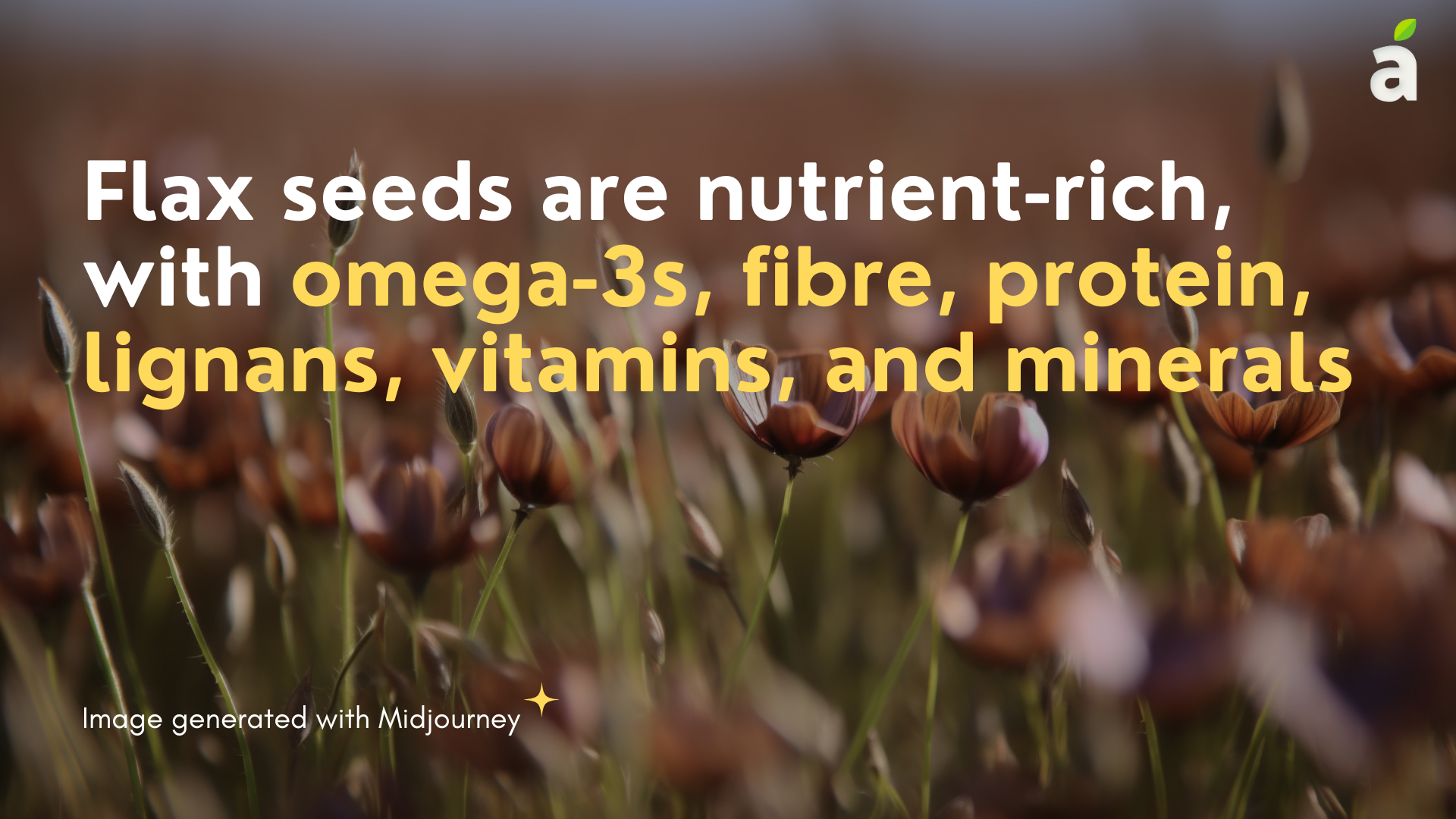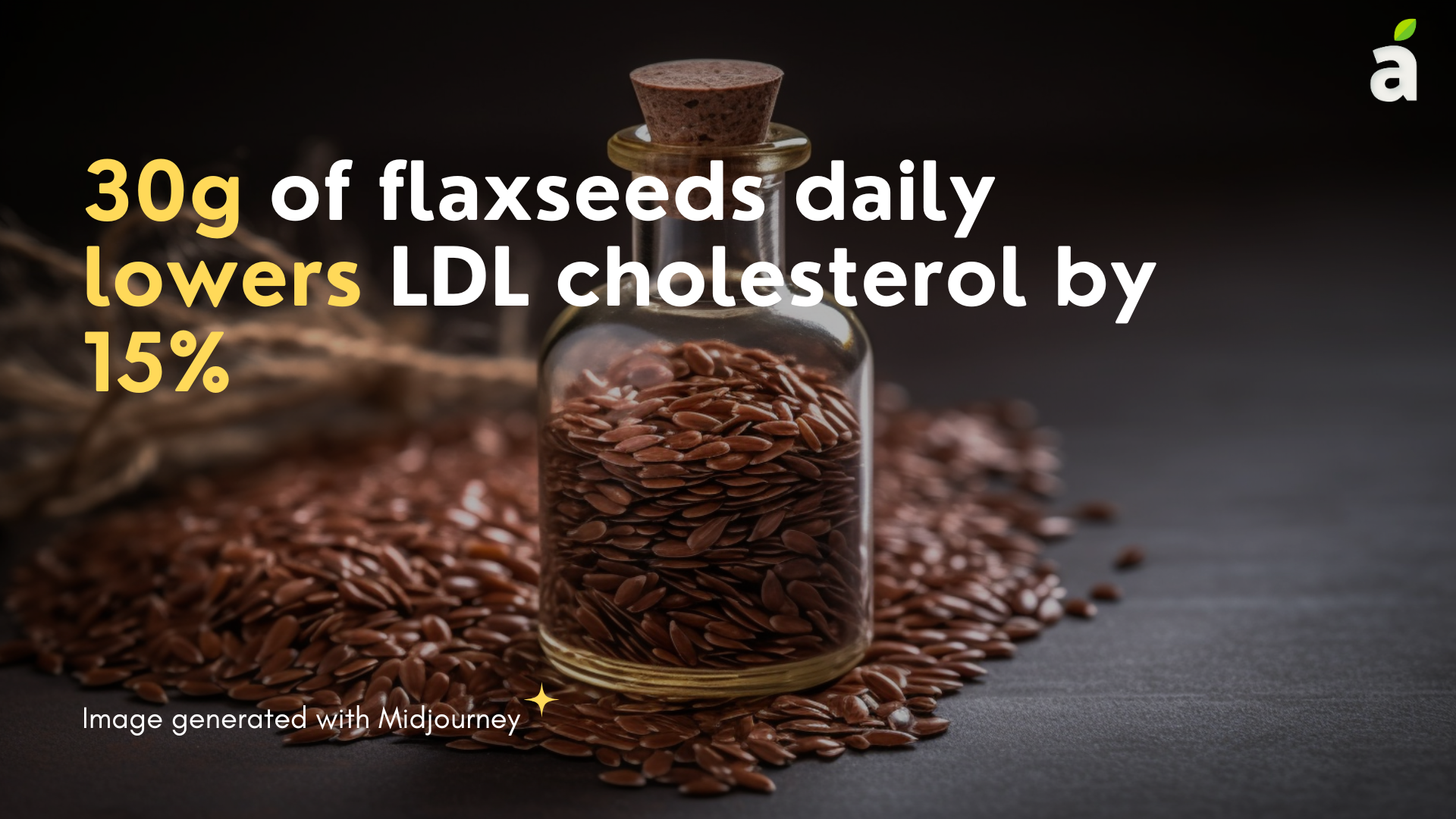Published Date January 24, 2003
Flax Seeds - The Superfood
By Naurin Ansari
3 min read
Last update date: January 24, 2003

In recent years, flax seeds have gained significant popularity as a superfood packed with numerous health benefits. These tiny seeds are derived from the flax plant (Linum usitatissimum) and have been used for centuries due to their nutritional value and medicinal properties.
In this blog, we will delve into the world of flax seeds, exploring what they are, their impact on digestion, their potential to lower cholesterol levels, and any possible side effects.
What are Flax Seeds?
Flax seeds also referred to as linseeds, are small seeds obtained from the flax plant. These seeds come in brown or golden varieties and possess a gentle nutty taste. Renowned for their impressive nutritional composition, flax seeds are rich in essential nutrients, including omega-3 fatty acids, dietary fibre, protein, lignans, vitamins, and minerals.
The history of flax seeds traces back to the Middle East, where they have been cultivated for thousands of years. In recent times, flax seeds have gained significant popularity as a heart-healthy ingredient, thanks to the abundance of beneficial compounds it possesses.
They can be easily incorporated into culinary preparations like muffins, bread, and cereals, and used as toppings, making them a versatile and nutritious addition to a balanced diet.[1][2][3][4]
Flax Seeds and Digestion
Flax seeds are nutrition powerhouses, every 10 grams of flax contain 55 calories, 1.9 grams of protein, 3 grams of carbohydrates, 0.2 grams of sugar, 2.8 grams of fibre, and 4.3 grams of fat.
One of the remarkable benefits of flax seeds lies in their ability to support digestion. The high fibre content in flax seeds promotes regular bowel movements and prevents constipation.
The soluble fibre in flax seeds forms a gel-like substance in the digestive system, which aids in the absorption of nutrients and promotes a healthy gut. Adding flax seeds to your diet can help maintain an efficient digestive system and alleviate common digestive issues.[5]
Flax Seeds and Cholesterol
Flax seeds have been found to have a positive impact on cholesterol levels. The soluble fibre and omega-3 fatty acids present in flax seeds can help lower LDL (bad) cholesterol and promote heart health.
Studies have shown that incorporating 30 grams of milled flaxseeds into the diet daily, reduces LDL cholesterol levels by 15%. The fibre in flax seeds binds with bile salts, causing cholesterol to be pulled from the bloodstream and into the liver for excretion.
This process helps lower cholesterol levels and contributes to a healthy lipid profile. It's important to note that flax seeds should be part of a balanced diet and a healthy lifestyle for optimal results in managing cholesterol levels.[6]
Side Effects of Flax Seeds
Flax seeds offer various health benefits, but it's important to be aware of potential side effects. Excessive consumption can lead to digestive discomfort and may affect individuals with medical conditions (like bloating, gas, or IBS) or hormonal imbalances.
Pregnant women should be cautious, as flax seeds contain components that can disrupt hormone balance and potentially harm fetal development. Diabetic individuals should monitor their intake due to the impact on blood sugar levels. Ground flax seeds are recommended for optimal nutrient absorption.[7]
Takeaway
Flax seeds are a powerhouse of nutrition, providing a wide range of health benefits. From aiding digestion to potentially improving cholesterol levels, these tiny seeds have earned their reputation as a superfood.
However, it is crucial to consume them in moderation and consult a healthcare professional if you have any underlying health conditions. Incorporating flax seeds into a well-balanced diet can be a simple and effective way to boost your overall health and well-being.
So, why not sprinkle some ground flax seeds on your morning oatmeal, blend them into smoothies, or use them as an ingredient in your favourite baked goods items. Embrace the nutritional power of flax seeds and let them work their magic on your journey to a healthier lifestyle.
References
- https://www.everydayhealth.com/diet/flaxseed-what-superfood-offers-how-add-it-your-diet/
- https://www.healthline.com/nutrition/foods/flaxseeds
- https://blog.ruschbiotech.com/5-ways-to-include-flaxseed-in-your-diet/
- http://www.ellies-whole-grains.com/eat-flax-seed.html#axzz7Q9bGdK3L
- https://www.healthline.com/nutrition/foods/flaxseeds#nutrition
- https://www.healthline.com/nutrition/benefits-of-flaxseeds#TOC_TITLE_HDR_6
- https://www.dietsmealplan.com/blog/side-effects-of-flaxseed/
Keep reading
Choose Healthy With Us.
Know the real truth about your food. Stay informed and healthy, for free.

Download the App Now
Certified nutritionists trust our food recommendations. Safe to say, so can you :)











